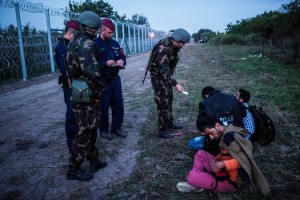Tough laws aimed at keeping out migrants came into effect in Hungary early Tuesday, a harsh new element in the European Union’s struggle with the influx of migrants and a further fraying of the bloc’s cherished principle of open borders.
As of midnight, migrants who tried to breach the109-mile fence made out of razor wire that is being constructed along Hungary’s border with Serbia faced the threat of arrest and criminal charges. Those who damage the recently built fence can also be punished with imprisonment or deportation.
 Nevertheless, the police said they had caught migrants trying to breach the border fence at three locations on the Serbian border, even after midnight, when the new rules came into effect. They said that a record 9,380 migrants were detained on Monday on suspicion of illegally crossing the border.
Nevertheless, the police said they had caught migrants trying to breach the border fence at three locations on the Serbian border, even after midnight, when the new rules came into effect. They said that a record 9,380 migrants were detained on Monday on suspicion of illegally crossing the border.
On Tuesday morning, state television showed a hole in the border fence, apparently cut by a group of migrants. The police detained 16 people, who now face prison terms and expulsion under the new rules.
In what appeared to be a move to shepherd migrants out of the country, the Hungarian authorities continued overnight to charter trains, carrying about 1,000 migrants at a time, from the border with Serbia to the border with Austria. Migrants were then allowed to cross into Austria, the local news media reported.
Zoltan Kovacs, a spokesman for Prime Minister Viktor Orban, said the new steps to stop illegal border crossings were a response to an “industrial scale” problem.
“Everybody eligible for asylum will be considered,” he said. “But a migrant should not be able to choose freely the country in which they claim asylum. Illegal border crossing has happened on an industrial scale here in Hungary. They’ve arrived in Hungary from 100 different countries, proving that this is a migration crisis and not a refugee crisis.”
He added: “As of today, illegal border crossing will be a crime, and a crime is a crime.”
The moves by Hungary, which has found itself to be an unwilling center of Europe’s migration crisis, are the latest blow to two decades of borderless travel in parts of the European Union, which now has 28 members. On Monday, Austria, Slovakia and the Netherlands followed Germany’s example over the weekend and introduced checks at their borders, effectively suspending Europe’s border-free Schengen Zone.
On Monday in Brussels, the European Union failed to agree on a modest plan that would have required countries to distribute 120,000 more migrants across the bloc.
The meeting of the bloc’s internal affairs ministers ended without even a semblance of consensus, as countries from Eastern and Central Europe, including Hungary, opposed rules dictating migration policy, which they argue undermine their national sovereignty.
The issue has created an East-West divide, with former Communist countries reticent of accepting a model that many there see as imposing multiculturalism on a region that sees itself as ill equipped to accept and integrate large numbers of migrants.
Mr. Kovacs said that the European Union needed to work to stop migrants from illegally entering the bloc in Greece, which has often been the entry point for people fleeing countries like Afghanistan, Eritrea and Syria. Hungary is eager for illegal migrants to be fended off before they can begin a trail via the western Balkans that eventually passes through Hungary and on to Austria, Germany or other destinations.
In Hungary, the police spent much of Monday trying to plug gaps in the border fence and at other entry points in Roszke, a town on the Serbian border that migrants have been flooding in recent weeks.
NYTimes